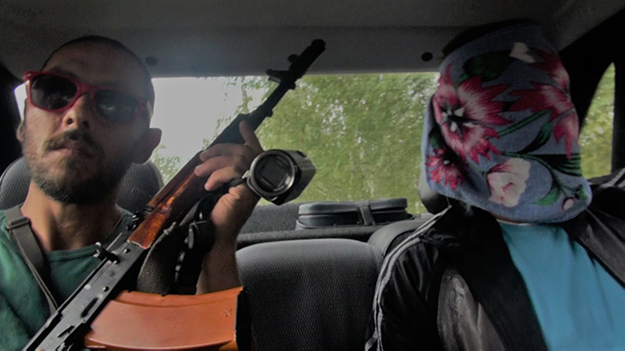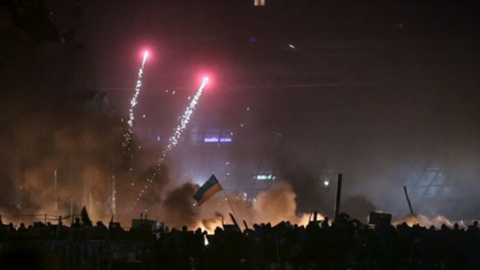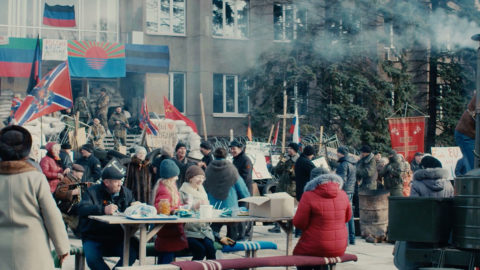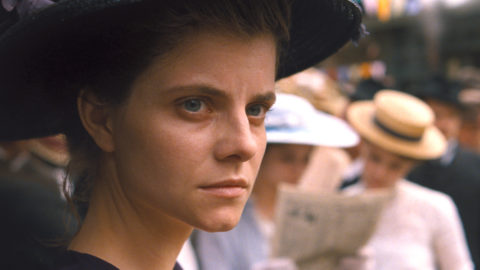Interview: Beata Bubenec
Flight of a Bullet screens Thursday, February 7 at Film Society of Lincoln Center as part of Film Comment Selects

“Don’t fuck my brain,” demands a soldier in the heat of an telephone argument with his girlfriend in Beata Bubenec’s Flight of a Bullet, a nonfiction film that in many ways threatens to do exactly that. Unfolding over the course of a single take, the action begins with a man being taken prisoner by the pro-Ukrainian partisans of the Aidar Volunteer Battalion, with whom Bubenec lived while shooting, and driven back to their headquarters for a tense interrogation. From there, however, Flight of a Bullet makes a number of surprising tonal and narrative detours, including a extended spell with the aforementioned irate boyfriend, all without breaking the continuity of the shot. Capturing many sides of life during wartime in its modest 81-minute runtime, it’s also an unusually frank commentary on gender dynamics in the erstwhile second world, making it a feminist film without much precedent.
Bubenec’s film has generated a good deal of controversy. Certain critics objected to her decision to include footage of the detained man, shot while the individual was in captivity. And in a very different corner of society, the premiere of Flight of a Bullet at Moscow’s Artdocfest was disrupted by members of the Russian nationalist right, who accused the film of spreading ethnic hatred. Bubenec was kind enough to Skype with me from her Moscow apartment to discuss these controversies, her filmmaking, and her estimation of the prospects (not great) for democracy in Russia.
Flight of a Bullet isn’t the first film that you’ve made that involves the war in Ukraine. Can you speak to how your previous experiences fed into its creation?
In December of 2013 I went to Kiev to film the Ukrainian Revolution, when the events in Crimea and the war in Donbass broke out. I caught these events on camera in a very direct way, as a witness. With this material I was able to make my film Chechen [2015], about an ethnically Chechen Russian citizen named Ruslan Arseyev, who became a sort of through-line in the film. But a lot of very rich footage didn’t make it into the film, and I felt a responsibility to make another that would include a lot of material that really hadn’t been shown anywhere. Initially, the idea wasn’t to make a one-shot film but to do the opposite, a big polyphonic production. Like War and Peace, you know, but a documentary film. The material was rich and varied enough to do this, but I needed an editor who could help to clarify things, so I decided to work with someone I had met at IDFA in Amsterdam. I looked to Ukrainian producers for financing because I figured that there wouldn’t be censorship there, and because Ukrainian filmmakers are much better supported internationally than Russian ones, because of the political situation.
At the beginning it all went very well. We got into a documentary workshop, a lot of people were interested in the idea and we expected that it would be a big new hit which would speak to a lot of people and could be sold to Netflix and so on. But then, with the Ukrainian film, people started saying that it was amoral to show pro-Russian separatists in a film funded by Ukrainian taxpayers. So despite the fact that the Ukrainian film fund had already approved the production, my producers got scared that it would hurt their relationships with their colleagues, fell into a stupor, and essentially froze the film. So the decision to do it as a one-take film was born in desperation from their self-censorship. For me it’s a protest against the idiotic systems and censors that stifle everything alive and truly talented.
So how did you become involved with the Aidar Volunteer Battalion?
It’s a long story. I went to Donbass to find Ruslan, the hero of Chechen, who I had met at Maidan [Square, during the protests] and with whom I traveled to Crimea and so on. Over time, though, my connection with him was broken. A while later, I discovered that he was living with the Aidar Battalion and went to a settlement in Donbass called “Happiness” in hopes of finding him. But there I was taken prisoner by Ukrainian forces—not the Aidar Battalion, but a different volunteer group— who took me for a Russian spy. Thanks to my Ukrainian friends I was freed, and they were the ones who connected me with the Aidar people. They knew Ruslan—not the Ruslan I was originally searching for but the one-eyed man you see in the film. And I decided to stay with them in order to find a protagonist for the film and because I figured that I would be safer with them than on my own.
Were they aware of your project or did they mostly just tolerate your presence?
They were all very aware of what I was doing. I made sure to introduce myself and my activities, so they knew who I was and that I was making a documentary film.
Were you thinking at all about creating this sense of unbroken time and space while you were filming?
The idea to do it as a single take didn’t emerge until much later. My editor lives in Paris, so I couldn’t just send him 400 hours of footage. I sent him this piece as a sample, because it showed all the main characters as well as many of the ideas for the film I wanted to make. He was very excited and said that just this 80-minute piece could make a very good film. Then I showed it to other international filmmakers, including Joe Bini, who’s edited a number of Werner Herzog’s films, and they agreed.
But even if you weren’t planning to do the whole film in one shot, were you thinking about long takes and a certain kind of continuity? In the film, it’s striking how dedicated you are to continue filming.
I think that was more of a reflex than anything. The situation was very intense, and all I could think was to keep the camera in front of me.
So now that you watch the final film, what do you think it gains from existing as a single take?
It’s all very tense. It’s a lot like war itself: you might be killed, but you also might just have a completely normal day, and the line between the two is incredibly thin. That’s what it’s like over there. It’s about the everyday life of wartime.
Do you have any plans for the rest of the footage?
Obviously I would like to do something with it. Right now, I am doing a project for YouTube. I want to create a channel to which I will upload some of the material I shot, just short videos and fragments. It’s like a series.
I was struck by the fact that you’re almost the only woman in the movie. How was your experience of such a hyper-masculine environment?
That was one of my concerns from the very start. When I was first meeting with producers, the thought was that I would be much more of a leading figure in the film. The title was going to be Me, Men, and War. And in many ways the finished film is also about the vulnerability of being the only woman surrounded by men. This is a major experience of wartime, but it’s something that’s also true in other situations as well.
The Russian far right protested the film at its Moscow premiere. Why were they so angry?
The Russian patriots were angry because the film depicts the Ukrainian forces in Donbass, who they see as their enemies. But it’s not just them. The same thing happened when I showed some of my material to the Ukrainians. At other points, I shot with the separatist forces, and they were angry for almost identical reasons, just the inverse. Neither side wants to see the other. I should also say that the protesters never actually saw the movie. It was a very strange situation for me. There was a lot of propaganda on TV that was anti-me, personally. They were saying very strange things about me, who I was, and the film I made. A lot of it wasn’t true, but a lot of people believed it anyway.
This wasn’t the only controversy that you were involved in. There’s also been a fair amount of objection to the inclusion of the footage of the captured man in the film. You’ve responded to these criticisms elsewhere, but I wanted to ask you what you’ve made of this controversy overall. Why do you think people took such exception?
On one side there were the Russian patriots, and on the other there were also these people who had an issue with the morality of the film. There were people who objected to the ethics, and then there were people who just didn’t like me or the film. Many of these people also didn’t see the film. I think that a lot of people just don’t think that one should be able to make a film in this way. To be honest, I don’t think that I understand their objections very well. The jury at Artdocfest had a rather negative reaction, but we weren’t able to have time for a conversation about it, so I never really got to hear their point of view.
The Russian state media has become notorious for its effectiveness as propaganda, and I think that this has been especially apparent in its coverage of the war in Ukraine. I know that you briefly worked in the Russian media—is this something that influenced your approach in making this film?
Of course. I initially wanted to be a journalist, but I realized that I couldn’t do journalism in Russia because there is no journalism in Russia. There is only propaganda. Because of this, most Russians don’t know anything about what’s going on in Ukraine. They think they do, but it’s all in their heads. It’s only their imagination.
I hear you’re currently making a film about Kseniya Sobchak’s 2018 campaign. Why was this interesting to you?
I think that Sobchak is an extremely interesting person. I also think that she is somewhat like me. She is counter to everything. People from all sides oppose her. Obviously the Putin people are against her, but the opposition doesn’t trust her either. She’s seen as being close to Putin because her father [former St. Petersburg mayor Anatoly Sobchak] was an early benefactor of Putin’s when his career was starting out. But I think that she’s very sincere in her beliefs and her actions. She also just has a fascinating personality and biography. She’s a unique product of Russian culture and society.
Russia certainly does not seem to be a democracy. How did your experience covering the campaign affect your perception of the country’s politics?
Of course Russia is not democratic. Kseniya and her campaign understood that as well. The hope was to use the election to communicate with the biggest part of the country possible. This is the problem that the opposition tends to have. The vast majority of the citizenry are not active on social media or looking for news on the Internet, but they do watch TV. The hope for the campaign was to get her messages on TV so as to try to influence this majority.
Do you think that Russia will have a real democracy any time soon?
[Laughs] How can I tell? I don’t think that anything short of a revolution will be enough to make Russia democratic, but it also doesn’t seem that Russia is about to have a revolution. It’s a very difficult situation.
Daniel Witkin is a writer and critic currently based in New York City.






